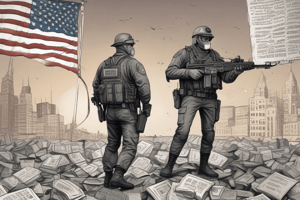Podcast
Questions and Answers
Which of the following accurately describes the Plain View Doctrine?
Which of the following accurately describes the Plain View Doctrine?
- Evidence in plain view can be seized only if the officer is in a private location.
- Evidence must always be secured with a warrant regardless of visibility.
- Evidence in plain view can always be seized without a warrant.
- Evidence that is in plain view can be seized if the officer has legal right to be where they are. (correct)
What requirement must a warrant meet according to search and seizure protocols?
What requirement must a warrant meet according to search and seizure protocols?
- It must allow for unlimited searches without restrictions.
- It must be vague and cover multiple locations.
- It must be a general consent warrant.
- It must specifically list items to be seized and places to be searched. (correct)
Which of the following agencies was the first state police agency in the United States?
Which of the following agencies was the first state police agency in the United States?
- California Highway Patrol
- Texas Rangers
- New Jersey State Police
- Pennsylvania State Police (correct)
What does the Fourth Amendment primarily protect against?
What does the Fourth Amendment primarily protect against?
Which of the following statements about constructed possession is accurate?
Which of the following statements about constructed possession is accurate?
Which constitutional amendment protects the right to bear arms?
Which constitutional amendment protects the right to bear arms?
What term describes actions taken by citizens to enforce the law without formal authority?
What term describes actions taken by citizens to enforce the law without formal authority?
What does the self-incrimination clause protect an individual from?
What does the self-incrimination clause protect an individual from?
Which amendment ensures the right to a speedy and public trial?
Which amendment ensures the right to a speedy and public trial?
Which branch of government is responsible for executing federal laws?
Which branch of government is responsible for executing federal laws?
What is required for Congress to override a presidential veto?
What is required for Congress to override a presidential veto?
What does the due process clause prevent?
What does the due process clause prevent?
Who appoints Supreme Court justices, and who confirms them?
Who appoints Supreme Court justices, and who confirms them?
Which amendment is focused on the prohibition of excessive bail and cruel and unusual punishments?
Which amendment is focused on the prohibition of excessive bail and cruel and unusual punishments?
How does the Fourteenth Amendment affect state governments?
How does the Fourteenth Amendment affect state governments?
Flashcards
Plain View Doctrine
Plain View Doctrine
If you're legally allowed in a place, you can seize evidence in plain view without a warrant.
Search Warrant
Search Warrant
A legal document allowing a search, listing specific items and places.
Vehicle Search
Vehicle Search
Allowed with owner consent or if there's probable cause. Can't detain occupants.
Area of Immediate Control
Area of Immediate Control
Signup and view all the flashcards
Fourth Amendment
Fourth Amendment
Signup and view all the flashcards
First Amendment
First Amendment
Signup and view all the flashcards
Second Amendment
Second Amendment
Signup and view all the flashcards
Search and Seizure
Search and Seizure
Signup and view all the flashcards
Self-Incrimination Clause
Self-Incrimination Clause
Signup and view all the flashcards
Due Process Clause
Due Process Clause
Signup and view all the flashcards
Imminent Domain Clause
Imminent Domain Clause
Signup and view all the flashcards
Speedy Trial
Speedy Trial
Signup and view all the flashcards
Impartial Jury
Impartial Jury
Signup and view all the flashcards
Executive Branch
Executive Branch
Signup and view all the flashcards
Legislative Branch
Legislative Branch
Signup and view all the flashcards
Judicial Branch
Judicial Branch
Signup and view all the flashcards
Study Notes
American Criminal Justice System
- Originated with English roots, specifically London's Metropolitan Police Force (The Met), founded by Sir Robert Peel.
- Early American policing often involved vigilante justice and religious enforcement (e.g., expulsion from church for lawbreaking).
- First American police department: New York City Police Department.
- First state police agency: Pennsylvania State Police.
Search and Seizure
- Plain View Doctrine: Legally obtained location allows seizure of visible evidence without a warrant.
- Warrants: Necessary for searches (unless with consent). Warrants must specify items and locations. Cannot be general.
- Vehicle Searches: Permissible with consent or if arresting occupant and if in immediate control.
- Area of Immediate Control: Allows search of the area around an arrested person without a warrant.
- Constructive Possession: Evidence linked to someone can be seized even if not on their person.
Constitutional Amendments
- First Amendment: Freedom of Speech.
- Second Amendment: Right to Bear Arms.
- Fourth Amendment: Protection from unreasonable searches and seizures by government.
- Fifth Amendment:
- Grand Jury indictments for serious crimes.
- Protection against double jeopardy.
- Protection against self-incrimination.
- Due process of law.
- Eminent domain clause (taking private property for public use with compensation).
- Sixth Amendment: Right to speedy, public trial, impartial jury, legal counsel, confrontation with witnesses.
- Eighth Amendment: Protection against excessive bail, fines, or cruel and unusual punishments.
- Fourteenth Amendment: Applies federal constitutional amendments to the states via the due process clause.
Branches of Government
- Executive Branch (President):
- Commander-in-Chief of armed forces.
- Veto power over legislation (Congress can override with 2/3 vote).
- Appoints officials, including Supreme Court justices (Senate confirmation).
- Legislative Branch (Congress):
- Bicameral (House of Representatives and Senate).
- House introduces tax legislation; Senate confirms presidential appointments.
- Congress makes federal laws.
- Judicial Branch (Supreme Court):
- Appointed by President, confirmed by Senate.
- Lifetime appointments (“good behavior”).
- Interprets the Constitution.
Studying That Suits You
Use AI to generate personalized quizzes and flashcards to suit your learning preferences.




